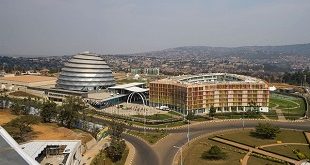Lyttleton speech
Towards the end of June 1953, Oliver Lyttleton, the Colonial Secretary, made a speech which made incautious reference to the possibility of “still larger measures of federation of the whole of East African territories.” This speech threw overboard all the agreements that had been made. The speech has been treated as the trigger of the crisis that engulfed Buganda from 1953 to 1955.
Reflecting about the speech some years later, Don Marshall, who was taking minutes of the meeting between Muteesa and the Governor, and therefore had pretty intimate knowledge of what was going on, has observed in an essay, The Deportation of Kabaka: “Having now read the relevant parts of the Kabaka’s book, The Desecration of my Kingdom, I cannot help wondering whether that speech was perhaps the excuse for which the Kabaka had been waiting. In his book the Kabaka said he was at loggerheads with Cohen from the outset after Cohen took office in January 1952 and that ‘…Cohen’s plans for a unitary state with a Legislative Council directly elected could not include me…”
“He went on to say that Cohen ‘…failed to see that I enjoyed the total support of my people…and that he was misled by his African friends…I think he decided …that any influence of mine must be destroyed, perhaps by discrediting me, or perhaps by more drastic means.’”
Early in August, the Kabaka signed a long letter to Cohen, requesting that Buganda should be transferred from the jurisdiction of the Colonial Office to that of the Foreign Office, a move that would essentially recognise Buganda as independent. It was not clear what would happen to the rest of Uganda.
The letter also asked the British government to “prepare and put into effect a plan designed to achieve our [i.e. Buganda’s] independence and if possible within a short stated space of time”.
On August 11, 1953, the Governor, in a speech to the Legislative Council announced that there would be direct elections to the Legislative Council (Parliament).
The Governor flew to London for consultations with the Colonial Office in October. He returned on October 27 with a catalogue of undertakings the Kabaka was to give. Cohen was also authorised to go ahead with deportation if it became necessary.
After the meeting of November 6, 1953, Cohen and his advisers were of the unanimous view that, if the Kabaka retained his intransigent attitude when he next met the Lukiiko, he was likely to advise it to oppose the Protectorate government as well as Her Majesty’s Government. Such action could result in unrest. To pre-empt the situation, they felt, it might become necessary to remove the Kabaka.
Don Marshall, who was keeping minutes of these meetings, has given us the position as it obtained after the meeting. “As the discussion between the Governor and Kabaka went on, it became increasingly clear that the Kabaka would not budge from the stand he had taken; he was adamant in his demands that the responsibility of Buganda should be transferred to the Foreign Office, and subsequent independence be granted; and he was steadfast in his refusal to advise the Lukiiko to nominate Buganda representatives to sit in the Uganda Legislative Council – a measure to which he had agreed earlier in the year.
“This was not just a clash of personalities between the Governor and the Kabaka, but a determined attempt by the Kabaka to thwart Her Majesty’s Government long-established policy of developing Uganda as a unitary state. In short the Kabaka was refusing to honour his obligations under the Agreement of 1900.”
When Andrew Cohen was sent to Uganda as Governor in 1952, his mission was clear-cut: to foresee the decolonisation of the yet-to-be state, Uganda. However, stiff resistance from Kabaka Muteesa and his ministers awaited his plans and the Governor would have to liaise with his superiors back in London, to ensure his plans work.
Kabaka Muteesa had been opposed to the inclusion of Ugandans to the Legislative Council, a move aimed at widening political space and inclusion beyond Buganda.
In that regard, on November 6, 1953, the Attorney General unveiled a threat of withdrawing recognition from Kabaka Muteesa for defying an arrangement under the 1900 Buganda Agreement that required him to cooperate with the colonial government.
At a meeting on November 27, 1953 the Kabaka was required to accept Her Majesty’s Government replies to his letter of August, and convey to the Lukiiko as the final word on all points raised in the letter. He was also expected to pledge full cooperation in the future progress of Buganda as an integral part of the Uganda Protectorate, including nominating Buganda representatives to the Legislative Council.
When the Kabaka rejected the conditions without first consulting the Lukiiko, the Governor requested the Kabaka to consider the matter very carefully during the ensuing weekend and return for a further meeting on November 30, 1953.
Unknown to the Kabaka and his advisors, arrangements had already been made for his deportation to Britain. Two Hercules aircrafts of the Royal Airforce Transport command had landed at Entebbe airport the morning of November 30, ready to fly the Kabaka out. Fred R.J. Williams had been asked to report to the Governor’s office on the morning of November 30, 1953 with sufficient clothing as he might be required to travel to an undisclosed place at very short notice.
As it later transpired, Williams was to accompany the Kabaka on the flight to England. Williams came to know the Kabaka when he spent three years at the office of the Resident of Buganda, and was thus considered the king’s friend.
When Williams arrived at the Governor’s office that morning, he was told the Kabaka and the Governor were in a meeting. He was asked to join Mr Deegan, the commissioner of police and Owen Griffith, the governor’s secretary, in an ante-room.
Meanwhile, at a tense meeting on November 30, 1953, the Kabaka categorically refused to accept the colonial government’s conditions. Katikkiro Kavuma disclosed in his book that the Kabaka, his Aide-de-Camp and the Resident all had revolvers.
It had been pre-arranged that when it became clear that the Kabaka was not going to give in, the Attorney General would leave the meeting to set ready the constitutional documents declaring a State-of-Emergency. Soon after the Governor followed and signed the documents. After that, Governor Cohen told the Commissioner of police and Williams that the Kabaka was to be deported and that Williams was to accompany him to London.
The Governor then signed the deportation order which had already been prepared and emphasised to Williams that the Kabaka was to be treated with utmost consideration and courtesy. The Commissioner of Police went and served the deportation order to the Kabaka and informed him he was to escort him to the airport to board a plane and go on deportation to England.
Williams recounts that he and the Commissioner of Police escorted the Kabaka to a waiting car and were driven to the airport. The car stopped beside the Royal Air Force plane whose engine was already running. Williams and the Kabaka got on board and were soon joined by Austin Malcolm, a member of the Police Special Branch and Robert Ntambi, an assistant Aide-de-Camp (ADC) to the Kabaka. The plane took off and so Kabaka Mutesa was deported to Britain.
 The Independent Uganda: You get the Truth we Pay the Price
The Independent Uganda: You get the Truth we Pay the Price



